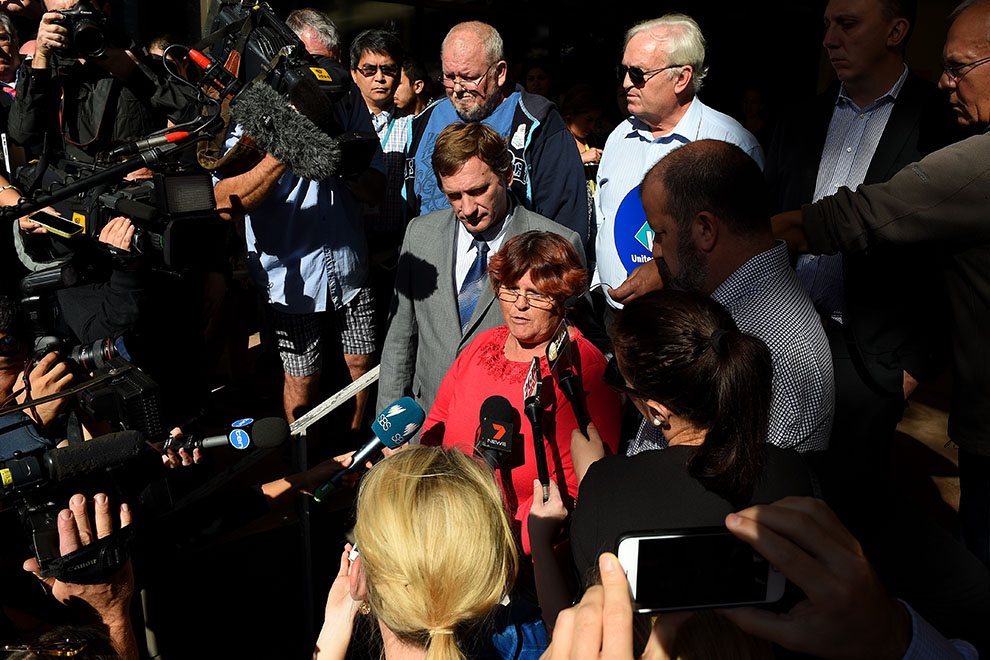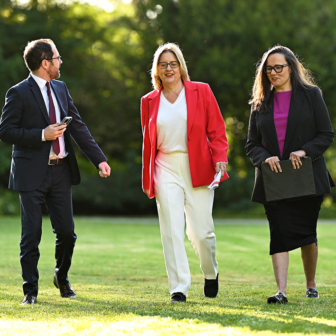Before it went to air on Wednesday night, SBS’s Struggle Street was already a hot topic in the news. Blacktown mayor Stephen Bali was calling it poverty porn made by high-paid media executives sitting in ivory towers. “They don’t understand the struggles of our community and they have no idea of the depth of compassion that is the backbone of Mt Druitt.” A convoy of garbage trucks from the western suburbs headed for SBS headquarters in north Sydney to make the point in another way.
Helen Kellie, speaking on behalf of SBS, was firm if a little stressed. In response to Bali’s allegation that scenes had been engineered to give a completely false impression, she insisted that the broadcaster stood by the program and was confident of the ethical standards maintained by production company KEO.
Expectations of the audience’s response were at the centre of the contention. According to a statement from SBS’s director of television, Tony Iffland, when the series was commissioned, Struggle Street would “push audiences to challenge who they are as a person and contribute to the national debate about what it means to be Australian.” Viewers would witness “resilience and dignity, the raw honesty and stories of family love that emerge despite overwhelming challenges.” Far from being an exercise in voyeurism, the argument went, the series was designed to provoke changes in public perception and debate about the direction of public policy.
But Taylor Auerbach, writing in the Daily Telegraph, was having none of that. Earlier this week he checked out the area in Darlinghurst where Struggle Street’s co-producer Leonie Lowe has an apartment. There, he reported on the activities of the local soy latte mockerati, describing their “hardships” with lashings of sarcasm.
Pre-broadcast speculation in the Twittersphere went every which way. “I’m going to watch just to find out if I’m to blame for their poverty,” wrote one respondent to Auerbach’s piece. “I’m sure I am and I’m sure that I must pay even more tax to provide for them. In fact, I’m willing to bet that will be the angle of the series.” Among comments on the SBS site, there was criticism for Mayor Bali – “We have a right to see the underbelly of life that Australia, and councils in particular, hide from us” – and some urging a cut to the chase. “Let’s get real about this. Unless the film is dishonest, what is there to fear? What is it going to show that should remain hidden?” As another tweeter put it, “until the public sees the doco we can’t know who is telling the truth.”
At issue, though, is what the producers had a right to show. It’s not a simple matter of truth, it’s a question of what kinds of distortion may have been introduced. And the underlying concern was about the spirit in which the series was made. Much of the commentary was expecting the audience’s responses to be the indicator of whether we were being indulged as mockerati or hectored as weary taxpayers, or whether this was a genuine attempt to connect with us as human beings of conscience. Curiously, this meant that we the audience were on trial as much as the program itself.
So how did we do? Viewing figures were high – SBS is reporting a record 1.3 million – and reviews so far have generally treated the program with respect. “Poverty porn, it is thankfully not,” wrote Guardian critic Steve Dow, and Rosie Waterland in Mamamia agreed: “It wasn’t exploitative, it was real.” The mockerati have not been much in evidence; instead, the prevalent response was closer to that expressed by Tiffany Dunk of Perth Now. “The overwhelming sense of what I walked away with after watching the show,” she wrote, “was ‘There but for the grace of God go I.’” Ivanka Pelikan, who appears in the program in her capacity as a support worker with the Graceades Cottage community centre, says the organisation has been inundated with offers of support.
If embarrassment and shame are the issue, they must surely be sheeted home to those of us who live in a prosperous democratic society that offers no useful support whatsoever to a young Indigenous man who is living in a tent in the bush on the outskirts of the suburb and can’t sign on at Centrelink because he doesn’t have an address. He comes across as practical, resourceful and (in the circumstances) unaccountably even-tempered. If he ever got any real money, he says, he’d buy a big house and give the rooms away to other homeless people.
The couple at the centre of last night’s episode provide a home for various children, grandchildren and pets, and deal with recurring crises triggered by visits from an adult son who is on ice. In another story-line, a teenage girl who has been thrown out of home and is recovering from a recent suicide attempt is taken in by another young woman who just wants to give her a chance. Meanwhile, Joe Hockey is up there in his office figuring out how much to cut off already hopelessly inadequate social services.
Anything that galvanises public opposition to cuts of that kind – and public support for better-funded services – surely has to be a good thing. And if that’s part of the impact of the program, it implies that viewers do see the participants with respect and some degree of identification.
That, though, is only one side of the story. There are ethical problems with Struggle Street, and they are serious. The complaints from participants – and from Mayor Bali on their behalf – include allegations that they were filmed when they specifically asked not to be, were refused the opportunity to preview the programs and approve the way they were being portrayed, and were misrepresented when editing and voiceovers manipulated the story-lines.
Journalistic codes of ethics are remarkably lax compared to those imposed on academic research, where informed consent is a stringent requirement. A man suffering cognitive impairment following a brain injury, a minor who is in a state of extreme psychological vulnerability following a suicide attempt, and a young adult addicted to ice are in no position to give that kind of consent. A university ethics committee would also want to know what support and assistance is available to participants who might react adversely to their involvement in the project. Helen Kellie’s assertions that SBS makes rigorous risk assessments has, I suspect, everything to do with managing risks to the broadcaster and little or nothing to do with risks to those who appear in the programs.
There seems to be no question that the makers of Struggle Street have ridden roughshod over these kinds of ethical rights, and that raises troubling questions about the spirit in which the programs have been made. KEO has a track record in this genre. Skint, a series it made for Channel 4 in Britain in 2013, focused on residents of Scunthorpe who were experiencing depression conditions following the closure of the steelworks. A second series along similar lines was set in Grimsby and a third, currently going to air, in Merthyr Tydfil in Wales. Each of these, and a series with a similar format called Benefit Street (also for Channel 4), have been major ratings successes. And that is undoubtedly a motivating factor for SBS.
The success of Skint and Benefit Street lay in their capacity to generate controversy along pretty much exactly the same lines as we have seen with Struggle Street. Newspaper columns, social media sites and radio talkback shows are abuzz with complaints of exploitation, avowals of fellow feeling and social outrage, or hissy fits about dole bludgers. From the broadcaster’s point of view, it’s a recipe for success.
While the charge of providing poverty porn for the mockerati may not stick, there may be another issue to consider. The subjects of these programs are unpaid labour, feeding a corporate production enterprise from which people make large salaries and build high-flying careers in international screen markets. The producers and managers may be sophisticated enough to make sure the social content they are dealing with looks real and serious and responsible, but the bottom line is that they are drawing some of the most vulnerable and deprived members of society into a project on which, as media entrepreneurs, they can build a success for themselves. •




